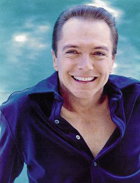
David Cassidy on the Web
David Cassidy recalls his life in TV movie
Ex-teen idol isn't bitter about his tough times
January 9, 2000
By Scott Pierce
Deseret News television critic
http://www.deseretnews.com
There are two things David Cassidy wants everyone to know. First, that he was never the guy he played on "The Partridge Family."
And, second, he's extremely grateful for that 1970-74 program, which made him an international superstar and made the rest of his career possible.
"I was 19, 20 years old, and look at the education I got. It served me so well the whole rest of my life," Cassidy, 49, said in a recent telephone interview with TV critics. "I learned how to write songs, how to craft songs. I've made 18 albums. I've sold 25 million records, and I never would've sold a record had I not done that show. I never would've learned how to be a songwriter. I never would've ended up being a producer or a director. So I thank God for that opportunity."
But, as is clearly portrayed in the NBC TV movie "The David Cassidy Story," which airs tonight at 8 on Ch. 5, playing Keith Partridge and everything that went with it was not always such a great experience at the time. Cassidy, who served as one of the telefilm's executive producers, describes himself as "a guy who had gotten very lost and isolated."
"I've never not been proud of my association with it or the fact that I became so successful from it, toured all over the world and played the biggest stadiums and arenas. Had the largest fan club in history and all that stuff," Cassidy said. "But I knew that continually perpetuating that stuff was making me more and more unhappy. . . . As soon as I drove through those (studio) gates, there were people following me home. It was madness around me. And my world just shrunk.
"I'm not complaining about it. I'm just telling you the mere facts that when you have to ride around in the trunk of a Toyota to get in and out of a building and you can't go to the grocery store or all the simple things that we take for granted . . . it's not a happy to place to be in, and it's not a normal way of living. And I had to let it go. I had to stop it."
"The David Cassidy Story" opens long before "The Partridge Family" when, as a young boy, he struggles with the fact that his father, actor Jack Cassidy, left his mother to marry Shirley Jones. And much of the movie is about the troubled relationship between Jack (Malcolm McDowell) and David (Andrew Kavovit).
"I was always hoping for his approval, and I never got it," Cassidy said. "And I think Malcolm did a great job of playing my father."
The movie is a blueprint for the pitfalls of fame. Cassidy, who was only 19 when he got the part, wasn't ready for it.
"It certainly deals with fame and what happened to me in being an idol and all of that, but it deals more with the human side of what the effects were on this person's life. And how I was never perceived as me," he said. "And yet, how fantastic it's been to have this enormous amount of equity of goodwill from people on the planet."
And the actor/singer said that "The Partridge Family" wasn't exactly what he thought it was going to be. "Family" was an upbeat, peppy little program about a widow (Cassidy's real-life stepmother, Shirley Jones) who joins her five children (including Susan Dey and Danny Bonaduce) in a rock band.
Cassidy's own musical influences and tastes ran toward Marvin Gaye, Jimmy Hendrix, Otis Redding, the Beatles, the Velvet Underground, Jeff Beck and Eric Clapton and Cream.
"When they told me this was a rock band, I assumed it was the rock that I had been listening to and was part of what my generation was. . . . In the screen test, I'm playing some Clapton or Hendrix thing," Cassidy said. "And when they came around and decided they were going to do music for this show and when they played me this music I went, 'You're kidding. This music has nothing to do with rock music or pop music or being in a band.' "
Which, he acknowledges, led to some major disagreements with the show's musical gurus.
"I complained . . . very early on that all of the songs sounded the same and that I wanted to evolve. After our third single went gold, I wanted to make edgier records and records that were more reflective of my own musical tastes," he said. "And they owned my name and my likeness and they owned me pretty much lock, stock and barrel. So I had to do what I had to do.
"I did it as well as I could do it, and I understood that there were millions of people out there that loved it, and I never resented them or anyone else for it. I just felt that someday there might be an opportunity for me to be able to show the world that David Cassidy was a lot more than that."
After four seasons, Cassidy found the show "artistically frustrating on a lot of levels." And part of that came from being a 24-year-old man playing a 17-year-old boy.
"I was singing songs that were focused for a 7- to 15-year-old, 16-year-old audience. I was walking in going, 'Hi, Mom. Can I borrow the keys to the bus?' That's tough to find real depth in that," Cassidy said with a laugh. "I wanted to do better work. I wanted to do different work. I wanted to do more serious work. And I fancied myself, at that time, as someone who was capable of doing a lot more than the audience or the world had ever seen."
But he disputes reports that he was bitter about his experience on "The Partridge Family."
"I never felt bitter about it. I never felt angry or hostile about my participation in it," Cassidy said. "I was always really proud of the fact that I had a very positive influence as a role model. . . . And even though I wasn't that white knight, I took great responsibility in what being that person was. And it became an enormous burden for a 24-year-old guy.
"I can't say I was always cheerful about it. Certainly in the few years after, I wanted to distance myself from it. But I was never apologetic about being so successful or about anything that I had done. About my work. About music. About selling millions of records, about making millions of people happy."
Not that "The David Cassidy Story" is altogether a "Partridge Family" movie the show ends its run midway through the telefilm and Cassidy's fall begins.
"What happened to me during the last couple of years of 'The Partridge Family' was I became so famous and so isolated and so unhappy that I had to do anything I could to end it. So I announced that this was my last world tour and I was retiring," he said. "I pretty much closed the book on that whole experience and closed the cover on that chapter in my life."
But that final tour included the death of a teenage fan in England during a concert, which sent Cassidy into a depression. And that depression deepened when first his father, then his trusted manager died. And his business manager absconded with millions of dollars of his money.
All of which "put me into a real emotional funk. I didn't work purposely, intentionally, for 3 1/2 years," Cassidy said.
And when he did decide to go back to work, he found that the ghost of Keith Partridge made it difficult for TV and movie producers to see him as anything else. It was "one of the most difficult periods in my life."
"At that point, I got off the train completely and said, 'You know what? Hollywood and television and all that stuff that was so great for me no longer really sees me as somebody who I believe I am, which is a creative guy. As an actor,' " he said. "And the opportunity wasn't there for me to do the kind of work that I wanted to do, so I went back into the theater."
And, like his life, the movie takes an upturn. It ends in the midst of his very successful 1993-94 run on Broadway in "Blood Brothers," in which he co-starred with his brother, Shaun. There's also a fantasy sequence in which Cassidy meets the ghost of his late father and a fun closing in which Cassidy joins Kavovit on stage at the Great Western Forum in Los Angeles and performs one of his old "Partridge Family" hits.
(The movie features not only original recordings of hits like "I Think I Love You," "C'mon Get Happy," "I Woke Up in Love This Morning" and "I Can Feel Your Heartbeat" but new tracks that Cassidy laid down for the production.)
It's a solid TV biopic that Cassidy fans will love and others will find interesting.
"If I can remove myself from it, it's kind of a fascinating story if you didn't have to live it," Cassidy said. "And even fascinating if you did have to live it and if you come out the other side and your life has really flourished."
Like all such projects, it telescopes events a bit and leaves out more than it puts in.
"I tried to be as honest as I could about it in the movie, but try to do 40 years of your life in an hour and 35 minutes of film. It's very difficult," Cassidy said.
The movie is also somewhat of a love story between Cassidy and his current (and third) wife Sue Shifrin. They've been together for 14 years and have an 8-year-old son, Beau, but have known each other since the heyday of "The Partridge Family."
"She had a lot to do with my metamorphosis as a human being and my career. . . . I feel very fortunate to have met someone that loves me and cares for me and has been such a great partner," Cassidy said.
In recent years, Cassidy has been a huge success in Las Vegas, first starring in "Ef/X" and now as the producer and director of the musical "The Rat Pack Is Back." He's currently in rehearsals for "At the Copa" at the Rio in Las Vegas, which opens on Saturday a show he eventually wants to take to Broadway.
"I'm producing it. I wrote it. It's quite an exciting thing," he said. "I think it's hybrid between a Broadway musical and a Vegas headlining show."
Cassidy said there was "no question" that his perspective on his experience has changed and mellowed over the years.
"Part of the cruelty of life (is that) after you're 40, you can sit and say, 'You know, it was really amazing that I did that and I just didn't think anything about it,' " he said. "It's not that I didn't appreciate it, but I couldn't possibly because I hadn't lived enough. When you go through hell, your own personal hell, and you have lost loss of fame, loss of money, loss of career, loss of family, loss of love, loss of your own identity that I experienced in my own life and you've been able to face the demons that have haunted you . . . I appreciate everything that I have.
"You couldn't possibly, 25 years ago, appreciate it the way you do now. Every day is a blessing, not to get too schmaltzy, but, really, it is."
